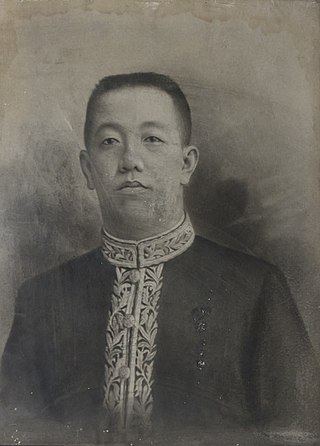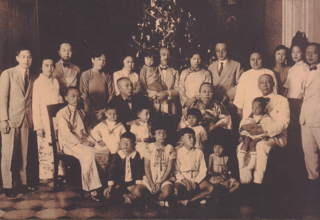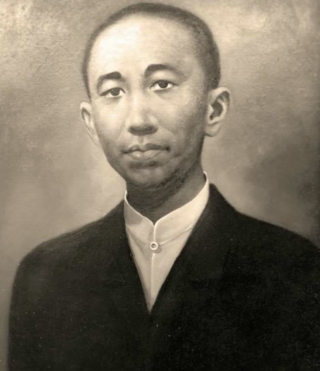Related Research Articles
Adrian Willem Ban Kwie Lauw-Zecha,better known as Adrian Zecha,is an Indonesian hotelier and founder of several international hotel companies including Regent Hotels,GHM Hotels,Aman Resorts,and Azerai Resorts,among others. Zecha was also part-owner of the renowned London’s Dorchester Hotel,and Bangkok’s The Sukhothai Hotel through his investment company.

Khouw Kim An,5th Majoor der Chinezen was a high-ranking Chinese Indonesian bureaucrat,public figure and landlord who served as the fifth and last Majoor der Chinezen of Batavia,Dutch East Indies. The Chinese Mayoralty was the highest-ranking,Chinese government position in the East Indies with considerable political and judicial jurisdiction over the colony's Chinese subjects. The Batavian Mayoralty was one of the oldest public institutions in the Dutch colonial empire,perhaps second only in antiquity to the viceregal post of Governor-General of the Dutch East Indies.

Tio Tek Ho,4th Majoor der Chinezen was an ethnic Chinese bureaucrat in the Dutch East Indies who served as the fourth and penultimate Majoor der Chinezen or Chinese headman of Batavia,now Jakarta,capital of Indonesia. This was the most senior position in the Chinese officership,which constituted the Chinese arm of the civil bureaucracy in the Dutch East Indies. As Majoor,Tio was also the ex officio Chairman of the Chinese Council of Batavia,the city's highest Chinese government body.
Khouw Tjeng Tjoan,Luitenant-titulair der Chinezen was a Chinese-Indonesian magnate and landlord.
Che Engku Chesterina is a former Indonesian ballerina who became a Malaysian royal after marrying Tunku Tan Sri Abdullah,a prince of Negeri Sembilan and founder of Melewar Group.
Khouw Tjeng Kee,Luitenant-titulair der Chinezen was a Chinese-Indonesian magnate and landlord in Batavia,capital of the Dutch East Indies.

Khouw Yauw Kie,Kapitein der Chinezen (1860–1908),also spelled Khouw Jaouw Kie,Yaouw Kee, was a high-ranking Chinese-Indonesian bureaucrat. He was the first scion of the influential Khouw family of Tamboen to serve on the Chinese Council of Batavia.
Khouw Tjeng Po,Luitenant-titulair der Chinezen was a Chinese-Indonesian magnate and landlord in Batavia,the capital of the Dutch East Indies.
Lauw Tek Lok,Luitenant der Chinezen was a high-ranking government official and landlord in Batavia,Dutch East Indies,and a member of the Lauw-Sim-Zecha family,part of Java’s Cabang Atas gentry. He is remembered today for his long tenure as Luitenant der Chinezen of Bekasi,and for his interracial marriage with Louisa Zecha.

The Lauw-Sim-Zecha family is an Indonesian family of the 'Cabang Atas' or the Chinese gentry of the Dutch East Indies. They came to prominence at the start of the nineteenth century as Pachters,Landheeren (landlords) and Kapitan Cina in the colonial capital,Batavia,and in the hill station of Sukabumi,West Java. The family is of mixed Peranakan Chinese and Indo-Bohemian descent.

Tan Tjoen Tiat,2nd Majoor der Chinezen was a Chinese-Indonesian bureaucrat who served as the second Majoor der Chinezen,or Chinese headman,of Batavia,now Jakarta,capital of Indonesia. This was the most senior Chinese position in the colonial civil bureaucracy of the Dutch East Indies. As Majoor,Tan was also the Chairman of the Chinese Council of Batavia,the city's highest Chinese government body.

Han Oen Lee,Luitenant der Chinezen (1856—1893) was a magnate of Chinese descent in the Dutch East Indies,who governed the Chinese community of Bekasi as its Luitenant der Chinezen,an important administrative post in the Dutch colonial bureaucracy. He was also the Landheer (landlord) of the particuliere land of Gaboes. Today,he is best known as the father of the late colonial statesman Hok Hoei Kan (1881—1951).
Kang Keng Tjong,also spelt Kan Keng Tiong,was a Chinese-Indonesian tycoon and one of the richest men in Batavia,capital of the Dutch East Indies.
The Kwee family of Ciledug was an influential bureaucratic and business dynasty of the 'Cabang Atas' or the Chinese gentry of the Dutch East Indies. From the mid-nineteenth until the mid-twentieth century,they featured prominently in the colonial bureaucracy of Java as Chinese officers,and played an important role in the sugar industry. Like many in the Cabang Atas,they were pioneering,early adopters of European education and modernity in colonial Indonesia. During the Indonesian Revolution,they also hosted most of the negotiations leading to the Linggadjati Agreement of 1946.
Francisca Louisa Zecha (1848–1939),usually known as Louisa Zecha,was a prominent,colonial Indonesian community leader and the Indo-Bohemian matriarch of the Lauw-Sim-Zecha family,part of the 'Cabang Atas' gentry of the Dutch East Indies. She attracted significant attention due to her controversial interracial marriages to two Peranakan Chinese magnates,Lauw Tek Lok,Luitenant der Chinezen of Bekasi and Sim Keng Koen,Kapitein der Chinezen of Sukabumi. The posts of Kapitein and Luitenant der Chinezen were high-ranking civil administration positions in the Dutch colonial bureaucracy. Zecha's community leadership,philanthropy,personal bravery and longevity earned her widespread respect and admiration in colonial society by the time she died in 1939.
Lauw Ho,also spelled Lauw Houw,was a prominent tax farmer (pachter),tycoon and ancestor of the Lauw-Sim-Zecha family,part of the 'Cabang Atas' gentry of the Dutch East Indies.
Aristide William Lauw-Zecha (1899-1983),usually known as William Lauw-Zecha,was an Indonesian plantation owner,businessman;and –as an alumnus of the class of 1923 of Iowa University –he was the first Indonesian to graduate from an American university. He belonged to the Lauw-Sim-Zecha family,part of the 'Cabang Atas' gentry of the Dutch East Indies,and is the father of the hotelier Adrian Lauw-Zecha,founder of Aman Resorts.

Oey Djie San,Kapitein der Chinezen was a Chinese-Indonesian public figure,bureaucrat and landlord,best known for his role as Landheer of Karawatji and Kapitein der Chinezen of Tangerang. In the latter capacity,he headed the local Chinese civil administration in Tangerang as part of the Dutch colonial system of 'indirect rule'.
Tan Tiang Po,Luitenant der Chinezen (1846–1912),also spelled Tan Tjeng Po,was a colonial Chinese-Indonesian bureaucrat,landowner,philanthropist and the penultimate Landheer (landlord) of the domain of Batoe-Tjepper in the Dutch East Indies.
References
- 1 2 3 4 "MEVROUW ZECHA† Nijver en toegewijd leven". De Indische courant. 3 February 1939. Retrieved 10 May 2020.
- 1 2 3 4 5 6 7 Tan, Mely G. (1963). The Chinese of Sukabumi: A Study in Social and Cultural Accommodation. Ithaca: Cornell University. Retrieved 10 May 2020.
- 1 2 Sekretariat Daerah Kota Sukabumi [Secretariat of the Municipality of Sukabumi] (29 September 2021). "Pemkot Sukabumi Kaji Nilai Sejarah Makam Kapitan Tionghoa [The Municipal Authorities of Sukabumi Assess the Heritage Value of the Tomb of a Kapitan Tionghoa]". Situs Komunikasi Dokumentasi Pimpinan Sekretariat Daerah Kota Sukabumi (in Indonesian). Sekretariat Daerah Kota Sukabumi [Secretariat of the Municipality of Sukabumi]. Retrieved 7 November 2022.
- 1 2 Redaksi Radar Sukabumi (29 September 2021). "Walikota Sukabumi Tinjau Makam Kapitan Sim Keng Koen" (in Indonesian). Radar Sukabumi. Radar Sukabumi. Retrieved 7 November 2022.
- ↑ "BENOEMINGEN ENZ. OP HEDEN. Civiel Departement". Java-bode : nieuws, handels- en advertentieblad voor Nederlandsch-Indie. 5 March 1880. Retrieved 10 May 2020.
- ↑ "Officiëele Berichten. Bestuur over Vreemde Oosterlingen". Java-bode : nieuws, handels- en advertentieblad voor Nederlandsch-Indie. 25 January 1887. Retrieved 10 May 2020.
- ↑ "BENOEMINGEN, ENZ. CIVIEL DEPARTEMENT". Bataviaasch nieuwsblad. 16 October 1889. Retrieved 10 May 2020.
- ↑ "Renoemingen, enz. CIVIEL DEPARTEMENT". De locomotief : Samarangsch handels- en advertentie-blad. 13 February 1892. Retrieved 10 May 2020.
- ↑ "NEDERLANDSCH INDIE. Batavia, 2 Maart 1899". Bataviaasch nieuwsblad. 2 March 1899. Retrieved 10 May 2020.
- ↑ "Bestuur over Vreemde Oosterlingen". Bataviaasch nieuwsblad. 27 August 1906. Retrieved 10 May 2020.
- ↑ "Melewar Group's Tunku Abdullah dies | The Star". www.thestar.com.my. 21 August 2008. Retrieved 10 May 2020.
- ↑ "Adrian Zecha (né en 1933) : ses hôtels hors de prix de la chaîne Aman ressemblent au paradis". Capital.fr (in French). 28 January 2016. Retrieved 10 May 2020.
- ↑ Magazine, Wallpaper* (29 March 2020). "How Aman has influenced the world of resort design". Wallpaper*. Retrieved 10 May 2020.